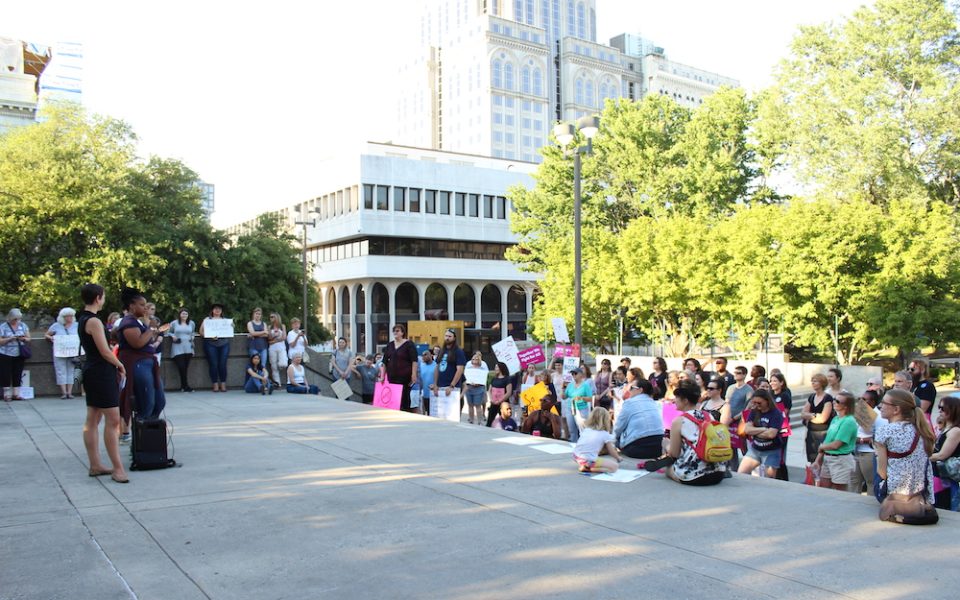More than 80 pro-choice abortion activists gathered at Governmental
Plaza in downtown Greensboro on Tuesday evening to support abortion access and
share personal stories.
Several came equipped with signs that had slogans scrawled
on them like “We will not go back” and “Public cervix announcement.”
Brandi Collins-Calhoun, a clinic escort at A Woman’s Choice,
a local abortion clinic, organized the event and shared her experience working
as a volunteer.
“If you really knew what the anti-abortion movement looked
like in Greensboro, it’s really concerning,” she said.

Collins-Calhoun has volunteered as a clinic escort, a person
who helps walk abortion patients from the parking lot to the clinic, for the
past two years.
“A few weeks ago we had 137 pregnancy center workers and
there was 13 of us,” she said.
Last week, Alabama Gov. Kay Ivey signed into law what most
consider as the strictest abortion bill in the country. HB 314 makes it a
felony for doctors to perform abortions and does not include exceptions for
rape or incest. Both the ACLU and Planned Parenthood have said they would file
a lawsuit to overturn what they say is an unconstitutional ban.
The increase in anti-abortion legislation comes at a time
when there is a conservative majority on the Supreme Court with the recent
appointment and confirmation of Brett Kavanaugh in October 2018. Many Republican
lawmakers hope that the lawsuits, like the ones that the ACLU and Planned
Parenthood are planning, make it up to the Supreme Court so that the conservative
majority will overturn Roe v. Wade.
A recent CNN article quotes Alabama state Rep. Terri Collins as saying, “This bill is about challenging Roe v. Wade and protecting the lives of the unborn, because an unborn baby is a person who deserves love and protection.”
Four other states — Kentucky, Georgia, Mississippi and Ohio
— have passed “heartbeat bills” this year that ban abortion once a fetal
heartbeat can be detected, which is as early as six weeks into pregnancy.
-

Women and children gathered at the rally on Tuesday. (photo by Sayaka Matsuoka) -

Several supporters brought their own signs to the rally on Tuesday. (photo by Sayaka Matsuoka) -

Supporters gather and wait for the rally to start on Tuesday. (photo by Sayaka Matsuoka) -

Posters and markers were provided for attendees to create their own signs. (photo by Sayaka Matsuoka) -

Dozens of pro-choice activists gathered in downtown Greensboro on Tuesday evening. (photo by Sayaka Matsuoka)
North Carolina has its own anti-abortion bill, nicknamed the “born alive” bill, which was vetoed by Gov. Roy Cooper in April. The bill would enact new punishments against medical providers who don’t care for newborns that survive an abortion procedure. Cooper vetoed the bill, saying in a public letter that “laws already protect newborn babies and this bill is an unnecessary interference between doctors and their patients. This needless legislation would criminalize doctors and other healthcare providers for a practice that simply does not exist.”
Now Republican lawmakers are working to override Gov. Cooper’s veto. They pushed back a scheduled vote to Wednesday, at the earliest.
“I will let the bill move when I think we have the vote to pass it,” said House Speaker Tim Moore in an ABC 11 article published on Monday. “The votes were simply not there to override the veto and I hope there are circumstances in the future where we have the votes.”
On Tuesday, several women shared their own abortion stories
and advocated for women’s right to choose and access safe abortions.
“When I got pregnant at 16, I made an appointment at Planned
Parenthood and I went and dealt with it,” said Alice Franks, who got an
abortion in the 1980s. “I didn’t have to go through all the hoops people have
to now.”
Other women, who lived in the pre-Roe v. Wade era recall seeing the devastating effects of not having legalized abortion.
Linda Falton, a retired pastor, recounted her personal
experience of working as a nurse and watching a patient who had a “back alley
abortion” performed on her die after she was admitted to the hospital.
“We cannot let it happen again,” she said. “The fight’s not
over.”

Collins-Calhoun, who has a daughter now, shared her own
story of not being able to get an abortion in the state because she was too far
along.
“I know what forced pregnancy feels like,” she said, as she
choked back tears. “People don’t often tell their forced pregnancy stories because
it’s frowned upon.”
Before the event closed, Collins-Calhoun listed the ways in
which people could fight for reproductive rights. She told the crowd that they
could donate their time, money or resources, and that the local clinic always
needs volunteers.
“This is what community looks like,” she said.
Join the First Amendment Society, a membership that goes directly to funding TCB‘s newsroom.
We believe that reporting can save the world.
The TCB First Amendment Society recognizes the vital role of a free, unfettered press with a bundling of local experiences designed to build community, and unique engagements with our newsroom that will help you understand, and shape, local journalism’s critical role in uplifting the people in our cities.
All revenue goes directly into the newsroom as reporters’ salaries and freelance commissions.


Leave a Reply